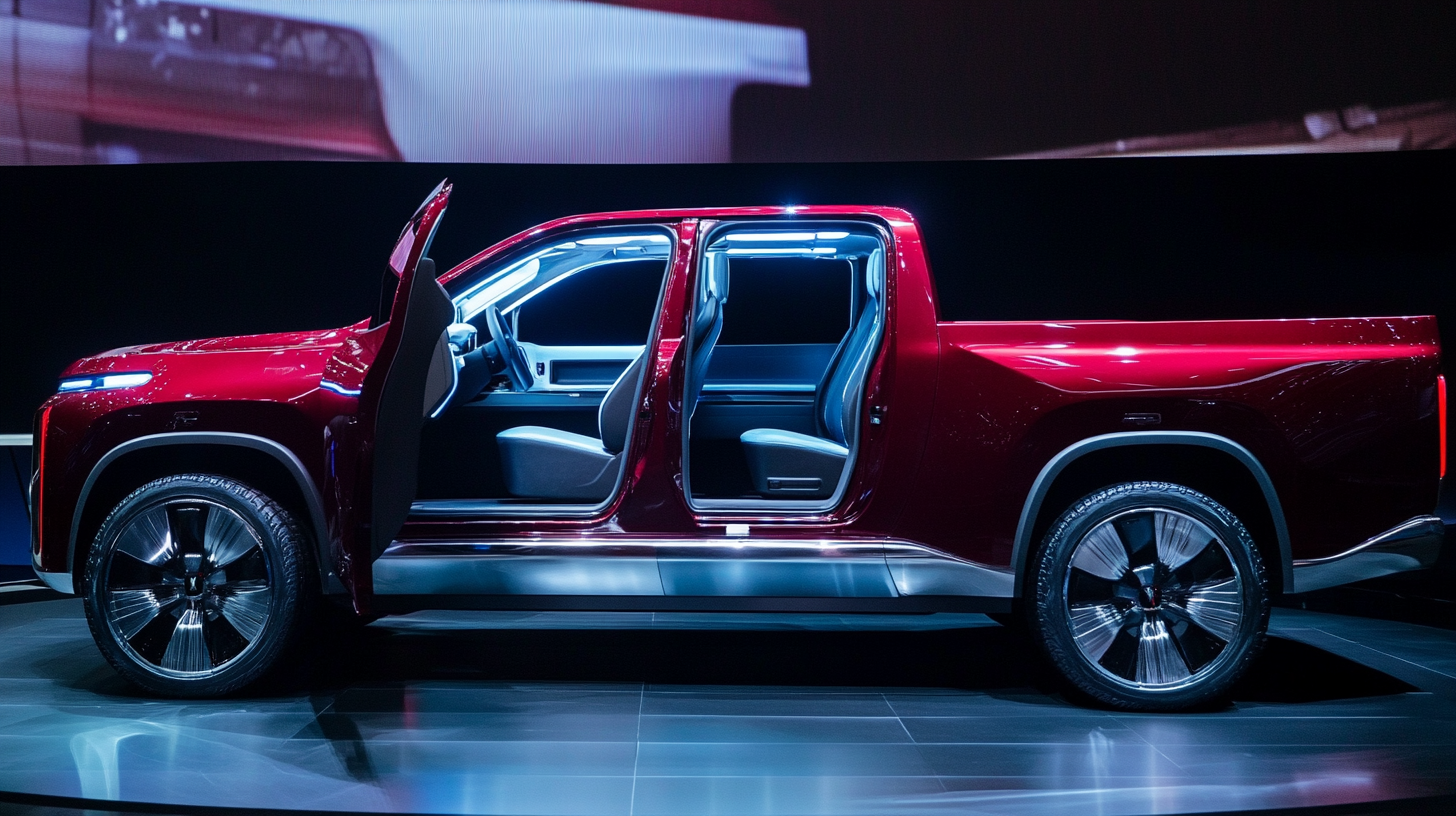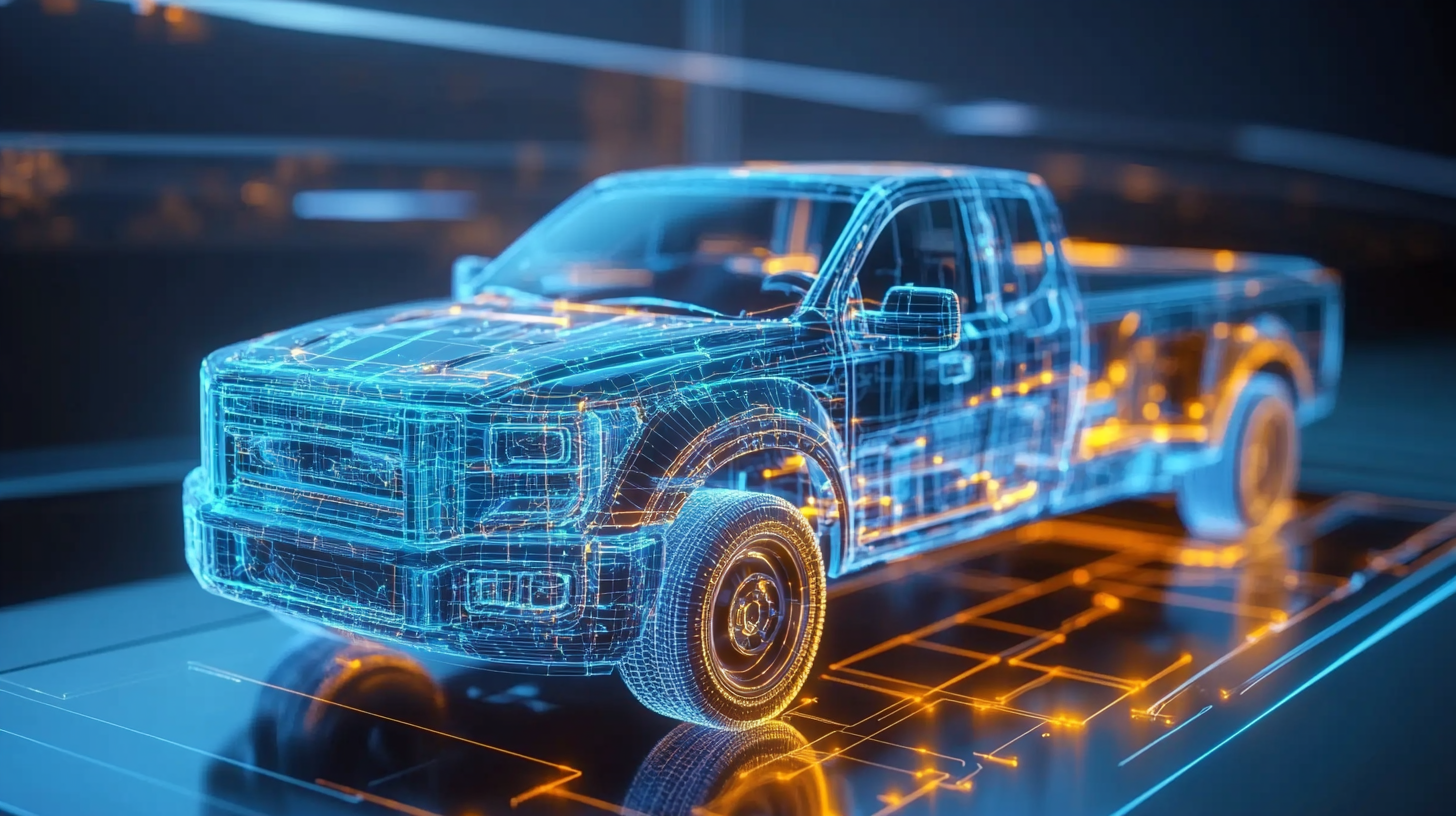Sorry. We did not find anything.
Maximizing Efficiency with Electric Pickups: Insights from 2023 Industry Trends and Market Data
As the automotive industry pivots towards sustainability, the rise of the electric pickup is becoming increasingly significant. Recent market analyses reveal that electric pickups are expected to account for over 14% of the total automotive market by 2025, reflecting a growing consumer appetite for zero-emission vehicle alternatives. Reports from major industry players indicate that sales of electric pickups are projected to surge by 30% annually, driven by innovations in battery technology and the expanding availability of charging infrastructure. These trends not only highlight the burgeoning demand for electric pickups but also underscore the potential for maximizing efficiency in both urban and rural transportation systems.
With the U.S. government incentivizing electric vehicle adoption through tax credits and state-level rebates, the momentum towards electric pickups is accelerating. Data from the Automotive Industry Association suggests that the average range of electric pickups has improved significantly, exceeding 200 miles on a single charge, which makes them viable options for a wider audience. The integration of advanced technologies, such as regenerative braking and smart energy management systems, further enhances their appeal, providing operational efficiencies that traditional pickups cannot match. This blog will delve into the latest industry trends and market data surrounding electric pickups, exploring how they can maximize efficiency in the years to come.

The Shift Towards Electric Pickups: Key Drivers for 2023
The automotive industry has witnessed a significant shift toward electric vehicles (EVs), and electric pickups are quickly becoming a focal point in this transition. As consumers increasingly prioritize sustainability, the demand for electric pickups is rapidly rising. Key drivers propelling this trend in 2023 include advancements in battery technology, increased range capabilities, and growing government incentives aimed at reducing carbon footprints. Battery technology has evolved tremendously, leading to lighter and more efficient energy storage systems. Electric pickups now offer ranges comparable to their gasoline counterparts, alleviating concerns about range anxiety among potential buyers. With improved charging infrastructure, drivers can recharge their vehicles easily, making electric pickups not just a sustainable choice, but also a practical one for daily use. As manufacturers ramp up production, we can expect an influx of models that cater to both the commercial and recreational market segments. Additionally, government policies and consumer incentives play a crucial role in driving the adoption of electric pickups. Many countries are offering tax rebates, grants, and other benefits to encourage consumers and businesses to switch to electric vehicles. These incentives, along with rising fuel prices and growing environmental awareness, are compelling more consumers to consider electric pickups as a viable alternative. As the market continues to evolve, the convergence of these factors will likely lead to a robust increase in electric pickup sales, positioning them as a mainstay in the automotive landscape.

Analyzing Market Data: Growth Trends in Electric Vehicle Sales
The electric vehicle market is witnessing a significant transformation, especially in the pickup segment. As sustainability becomes a focal point for consumers and businesses alike, electric pickups are emerging as a viable and efficient alternative to traditional gasoline-powered models. Market data from 2023 reveals an accelerating adoption rate driven by advancements in battery technology, range improvement, and increased charging infrastructure. These factors collectively contribute to a substantial rise in electric vehicle sales, particularly among pickup trucks, which resonate with both lifestyle consumers and commercial fleets.
In examining recent growth trends, it's evident that public perception is shifting. Many potential customers are becoming increasingly aware of the environmental benefits and long-term cost savings associated with electric pickups. Manufacturers are responding by rolling out more models, offering a range of options tailored to various needs, from workhorse trucks for commercial use to lifestyle-oriented vehicles for personal use. Notably, sales statistics indicate that electric pickups have not only captured the interest of early adopters but are now appealing to mainstream buyers seeking efficient and powerful transportation.
Furthermore, government incentives and rebates are playing a pivotal role in this transition. Various regions are implementing policies designed to encourage the adoption of electric vehicles, which further supports the pickup market's growth. As these trends continue to evolve, the potential for electric pickups to redefine efficiency and performance in the automotive landscape is becoming increasingly clear, positioning them as a crucial component in the future of transportation.

Efficiency Metrics: Comparing Electric Pickups with Traditional Models
As the automotive industry pivots towards more sustainable practices, electric pickups are emerging as formidable players in the market. According to the 2023 Industry Insights Report by McKinsey & Company, electric pickups are projected to constitute approximately 25% of the total pickup sales by 2026. This shift is significantly influenced by efficiency metrics that highlight the advantages of electric models over traditional gasoline counterparts.
One key metric is energy consumption, which, based on data from the Department of Energy, shows that electric pickups typically consume less than 50% of the energy per mile compared to traditional pickups. For instance, while a conventional pickup might average around 20 miles per gallon, an electric counterpart could offer an equivalent energy efficiency of around 3.0 miles per kilowatt-hour. This not only reduces the overall operational costs for consumers but also minimizes environmental impact, aligning with the growing demand for eco-friendly vehicles.
Moreover, the maintenance costs for electric pickups are considerably lower. A recent report from J.D. Power indicates that electric vehicle owners can save an average of $1,300 over 10 years on maintenance compared to their internal combustion engine (ICE) peers. This is primarily due to the reduced number of moving parts and the absence of oil changes and other traditional maintenance requirements. Therefore, as consumer preferences shift towards efficiency and sustainability, it is evident that electric pickups are not just a fleeting trend but are increasingly becoming a central part of the automotive landscape.

Consumer Preferences: What Drivers Are Looking for in Electric Pickups
As electric pickups gain traction in the automotive market, understanding consumer preferences becomes crucial for manufacturers aiming to optimize their offerings. Today’s drivers are increasingly looking for vehicles that combine efficiency with the capability and performance they expect from traditional pickups. Key factors influencing their purchasing decisions include range, towing capacity, and charging infrastructure.
One of the primary concerns for consumers is the range of electric pickups. Many drivers require a vehicle that can handle long drives, especially those who use pickups for work purposes or recreational activities. Recent data indicates that potential buyers desire a range of at least 300 miles on a single charge. This expectation drives manufacturers to invest in advanced battery technology to meet consumer demands for longer journeys without frequent recharging.
In addition to range, towing capacity remains a critical factor for those considering electric pickups. The ability to tow trailers, boats, or work equipment is a non-negotiable for many users. As such, brands are prioritizing the development of electric pickups that can match or exceed the capabilities of their gasoline-powered counterparts. Moreover, consumers show a preference for models that offer versatile charging solutions, such as fast-charging stations and home charging options, allowing for a seamless transition to electric power while maintaining their traditional lifestyle and work requirements.
Future Outlook: Innovations Shaping the Electric Pickup Landscape
The electric pickup landscape is rapidly evolving, driven by innovative technologies and market demands. Recent industry events have highlighted key trends that are shaping the future of electric pickups. As more manufacturers embrace electrification, the competition intensifies, leading to a surge in performance, design, and technological integration. This shift towards electric pickups is not just a response to emerging regulations but also an adaptation to consumer preferences that favor sustainability and lower operating costs.
Among the recent advancements, the integration of the latest battery technologies stands out, enabling longer range and faster charging times. Smart features, including automation and connectivity options, are becoming increasingly standard, providing drivers with a seamless blend of utility and tech-savvy performance. Additionally, ongoing efforts in material science are paving the way for lighter and more efficient vehicle designs, crucial for enhancing the performance of electric pickups in various applications, from personal use to commercial fleets.
As the market continues to mature, it is essential for stakeholders to stay informed about these innovations. Events focusing on technological advancements in the automotive sector indicate a strong commitment to R&D, revealing a forward-looking approach that aims to capitalize on the growth potential of electric pickups. With an array of possibilities on the horizon, the electric pickup market is set to redefine not just the transportation landscape but also the very framework of how consumers perceive utility vehicles in their daily lives.

